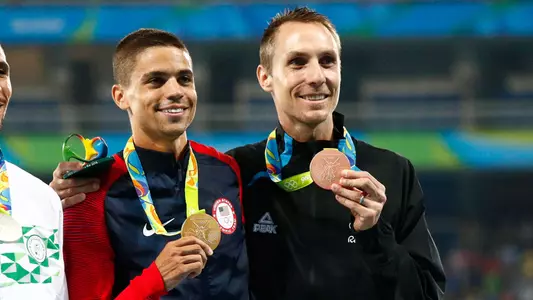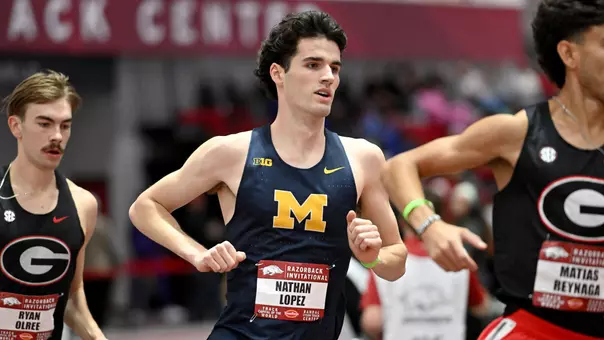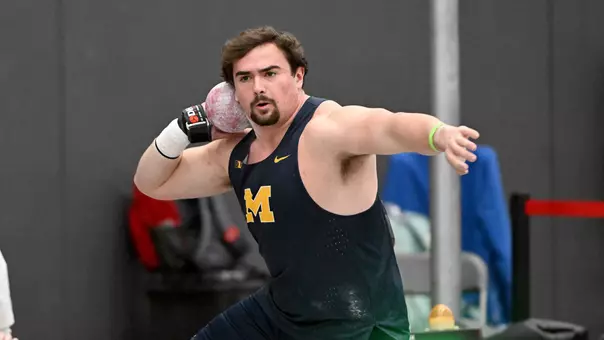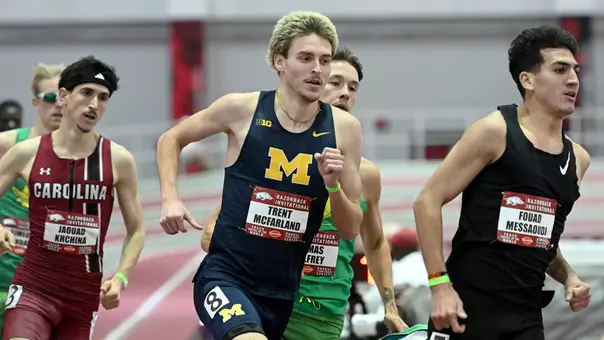
Hall of Honor Q&A: Nick Willis (Men's Cross Country, Track and Field)
11/11/2019 12:28:00 PM | Men's Cross Country, Men's Track & Field, Features
On Friday (Nov. 15), Nick Willis will become the 24th member of the men's track and field and cross country program to be inducted into the University of Michigan Athletics Hall of Honor.
Dating back to his All-America, record-breaking career at Michigan, Willis has long been one of the world's premier middle-distance runners. The New Zealander won NCAA titles for the Wolverines in the mile (2005) and the distance medley relay (2004) among his five All-America performances on the track, in addition to two All-America honors in cross country. Willis broke collegiate records in the indoor 3,000 meters (7:44.90) and distance medley relay (9:27.77) in 2004 and in the 4xMile relay outdoors in 2005. He also owns the outdoor school record at 5,000 meters (13:27.54).
His collegiate success translated directly to one of the most prolific outdoor careers in world history. He represented New Zealand at the 2004, 2008, 2012 and 2016 Olympic Games and in the six of the past seven biennial IAAF World Championships. Willis won the 1,500-meter bronze medal at the 2008 Games, which was later upgraded to a silver due to disqualifications, and he claimed the bronze medal at the 2016 edition of the Games. With a career best of 3:29.66 at 1,500 meters, he is the 26th-fastest man in the history of the world in that event. He has broken four minutes in the mile more than 50 times between the track and the road, doing so in 17 consecutive years, including 2019.
He graduated from U-M with a degree in economics and was inducted into the Michigan Men's Track and Field Hall of Fame in 2015.
As part of MGoBlue's Hall of Honor coverage this week, Nick reflects on his journey to Michigan and all of the international acclaim and accolades he has earned since.
Q. The Hall of Honor is the highest award any former Michigan student-athlete can achieve. What does it mean to you to be inducted into this exclusive club, with only 23 other men's track and field athletes?
A. It's a huge, huge honor, especially for someone who stayed around in Ann Arbor after graduating. It's really cool to be a part of the same club as all these people I've looked up to from other sports who I've put up on a pedestal, and you forget that your sport can be honored alongside them. It's very humbling.
Q. How was it that you ended up at Michigan, all the way from New Zealand?
A. I didn't know a lot about what differentiated the different universities, but the first thing was that I used to, every month, catch the bus into the capital city of New Zealand and go to the one magazine shop in all of the city that had Track & Field News. On the cover once I remember a guy wearing a big block 'M' on his singlet, and that stood out to me. I didn't know what it stood for then, but when I started researching universities I remembered it and I found out it was Michigan. It was Kevin Sullivan, who was a runner I really looked up to. He got fifth at the Olympics -- and, lo and behold, he's now the coach at Michigan -- so I thought, if that guy can get fifth at the Olympics and have a successful professional career after college, his coach must know what he's doing. A lot of the sentiment in New Zealand and Australia at the time was that if you took a scholarship to America, you might not have much left in the tank once you're finished after four years with trying to score points for your university. But I thought this coach must know a thing or two if he's had success with post-collegians. So I found out about Ron Warhust. It turned out my dad was going to be passing through as a visiting professor at Calvin College, so he came and took a visit on my behalf, and that was sort of the end of it. There wasn't too much more to be told.
Q. What was your favorite part of your experience at Michigan?
A. I loved, from the day I stepped onto campus and every day since then, how ambitious and how driven and motivated every person at Michigan is. I loved how much they truly believed they could achieve their very ambitious goals. They think that 'Why not me? If I work hard enough, I can do better and be a difference maker in whatever field I am pursuing, whether it be science or sports or engineering or music and arts or whatever.' Everyone has this incredible self-belief. I found it incredibly encouraging, because I felt that wasn't always the case in a lot of places I had been. It almost felt like you were weird when you were that ambitious. I grew up in a place that had a surfing and skateboarding culture, and it was cool to be good at something, but it wasn't cool to try to be good at something. I really fell in love with that about Ann Arbor and Michigan, and that is still the case today. Sometimes it can come across as arrogance, and I understand why that might be the case, but I've always enjoyed that mindset as a motivator for me. If someone's really pursuing excellence in their field -- and it doesn't have to be anything related to running -- that inspires me to pursue my field of excellence.

Willis celebrates his 2005 NCAA championship in the mile
Q. What was your most special achievement during your Michigan days?
A. Hosting the Big Ten indoor meet at the old indoor facility was a highlight for me. It's not often you get to run in front of your own fans at home in a championships setting. Normally you're always away and there's no such thing as home-field advantage like most other sports get to experience. It's one of the few times in my life where I've got to run in front of my home fans, and while I was expected to have success, it helped elevate me to another level. Our team did really well. We didn't win the Big Ten title, but we were second and that was very good for us. It was so much fun being able to sleep in your own bed and run in your own stadium and host all of the other schools. There are so many memories. My whole time in college at Michigan was great, and it's why I have stayed in Ann Arbor since.
Q. When you embarked on your professional career, could you have imagined racking up all the accomplishments, accolades and records that you've now accumulated?
A. Before coming to Michigan my hope was to one day be an Olympian, and that would have been enough. But Coach Warhurst had far more ambitious goals for me than I had for myself. I would have been content with having been an Olympian, and I would have never thought about medals or being able to go for this long and to make multiple Olympics or turn it into a career. To do this as my profession has been an absolute privilege, and without Ron and all the support I got from him in establishing that mindset, none of that would have been possible. It's still working to this day; if it ain't broke, don't fix it. I've stayed in town with him and done the same trails and run around Ferry Field a million times, and it's been a real journey.
Q. What is your favorite professional memory?
A. The two medals. The first one was doing something I never thought was possible. I remember the celebration on the track and bursting into tears that this kid from Lower Hutt actually got third at the Olympics and I never thought that was possible at all. That was unbelievable. The second medal was just as satisfying in a totally different way. It was after having a lot of downs and ups and injuries, and it was more internal satisfaction to have overcome and stuck with it. To be able to execute a race against people who were deemed to be a lot younger and faster and fitter, and to prove my own doubts wrong and all my supporters right was really, really satisfying.
Q. If you haven't already, you'll soon embark on your quest for a fifth Olympic Games representing New Zealand. What has been the most meaningful part of representing your home country at the Olympic level?
A. I've enjoyed going to the World Championships and the Commonwealth Games and the NCAA Championships and all the others, but I think it shows in my results that the Olympics have always mattered to me the most. It takes a lot of sacrifice to really get the most out of yourself. It's not just the training, it's the other 21 hours of the day. I'm willing to sacrifice to make sure no stone is left unturned, and I'm willing to say no to all the other distractions, and I think that's why I've performed best at the Olympics relative to all my other championships. It's the only thing that really gets me to be that disciplined to live the lifestyle that is really required to get the absolute best out of yourself. The Olympics are what most kids dream of, and I've seen how much it means to the fans, like when I was a kid, to see just one New Zealander represented in track and field. Now I get to be that person that other kids are watching in our little country for 4.5 million people, representing our country as the whole world is watching. I think of myself as a kid watching TV and seeing how cool it was seeing little old New Zealand represented in two or three track events, and now I can carry a flame for the next generation of sports fans in New Zealand.
Q. Not only are you going for your fifth Olympics, but you'll be looking to extend your streak of years with a sub-4 mile to 18 straight years. What is the secret to your longevity?
A. I've been very fortunate to have a very healthy balance of support people around me. My coach, Ron Warhurst, and my coach -- who is also my wife -- Sierra, they understand a healthy balance in life. They love running and they love coaching me, but that's not the primary source of conversation, and there's lots of other things in our lives, as well. There's a time to put your head down and put on the blinders, but the rest of the time needs to be a healthy balance. Sleep is the other thing. I've always had a knack for being able to take a nap every single day. I take a 90-minute nap every day so that I can keep my body functioning. I also live a lifestyle that doesn't really involve that much destruction to my body by choice, whether I'm running or not. I don't drink and I don't stay up late, just because I enjoy getting up early and seizing the day. Even if I wasn't running, I would be doing that lifestyle, and it makes it easier to not feel like your sport is as much of a burden. I think that's been helpful, as well.










